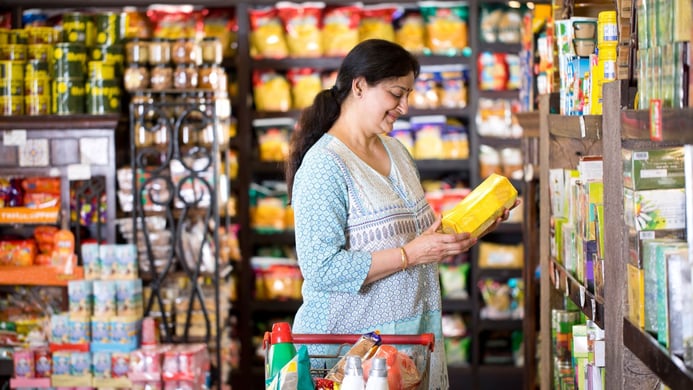
India’s retail and FMCG landscape is navigating a complex mix of opportunities and headwinds this September. The transition to GST 2.0 has disrupted sales in the short term, with subdued FMCG performance expected for the quarter as distributors and retailers work through old inventory. At the same time, a long-standing consumer anchor, the ₹5 and ₹10 price points, appears to be fading, as companies adjust pack sizes and pricing under the new tax regime.
To offset pressures, many FMCG majors are accelerating acquisitions of direct-to-consumer (D2C) brands, tapping into premium growth segments and gaining valuable digital insights. Yet concerns are also mounting, with FAIDA warning that structural cracks in the distribution system could threaten its viability. Beyond FMCG, the retail sector is being reshaped by digital and technological shifts, 74% of urban retail spends are now digital, while Deloitte forecasts AI investments in Indian retail to touch US$22 billion by 2027, transforming the consumer experience.
Click on the headings below for insights on how these trends are shaping India’s retail landscape…
1. FMCG sales to be hit in September quarter due to low demand, GST 2.0
Low demand and the transition to new Goods and Services Tax (GST) rates is seen to have a negative impact on the sales of fast-moving consumer goods (FMCG) companies that are expected to report subdued performance in the September quarter. According to distributors, the sales were impacted between September 1 and September 17, when retailers had stopped purchasing to exhaust old inventory, and distributors were trying to liquidate their existing inventory.
2. FMCG majors turn to D2C acquisitions for premium growth, digital insights: Crisil Ratings
Many established fast-moving consumer goods (FMCG) companies are acquiring direct-to-consumer (D2C) players with fundamentally distinct business models in terms of distribution and marketing, according to Crisil Ratings. The upshot here is a clear boost to growth and expansion into premium segments for FMCG companies. These acquisitions provide FMCG companies with access to personalised consumer insights, a unique feature of the digital channels that can drive accelerated feedback, rapid innovation cycles and targeted marketing.
The Federation of All India Distributors Associations (FAIDA), representing over five lakh distributors serving three crore retailers nationwide, has reportedly sounded the alarm over what it calls “serious risks” to the survival of India’s century-old distribution system. In a communication sent to FMCG, food and beverages, telecom, and mobile companies on September 27, FAIDA highlighted structural issues and business practices that it says are steadily weakening distributors’ position in the consumer ecosystem.
4. GST 2.0 reform kicks in: No more 'magic' price points? FMCG drops popular Rs 5 & Rs 10 packs
Popular price points of Rs 5 and Rs 10 are disappearing from India’s fast-moving consumer goods (FMCG) shelves. Parle-G, after two decades of selling its smallest biscuit pack at Rs 5, has now priced it at Rs 4.45. Other everyday items are also shifting- the Rs 1 candy now costs 88 paise, while a Rs 2 shampoo sachet is priced at Rs 1.77. The changes come as FMCG makers await clarity on how to pass on benefits under the next-generation GST reforms which came into effect in September.
5. Digital payments now 74% of retail spend in top Indian cities
NeoGrowth’s 9th edition of its NeoInsights study, “How India Pays”, highlights a sharp behavioural shift in India’s retail economy – with 74% of retail spending in these cities now digital, up from 45% just two years ago. Digital retail transactions – spanning UPI payments, credit cards, and debit cards – have become an integral part of everyday spending, with usage continuing to rise across India, the report notes.
6. AI revolutionises Indian retail as investments set to reach US$22 billion by 2027: Deloitte India
A Deloitte India report projects that AI investments in the Indian retail sector will hit US $22 billion by 2027, signalling large-scale adoption beyond pilot projects. Retailers are leveraging AI (including generative and “agentic” AI) to hyper-personalize customer journeys, optimise supply chains, and automate operations. The report also recommends frameworks and imperatives (such as AI-ready infrastructure, cross-functional collaboration, responsible AI, and test-and-learn mindset) to scale AI impact across the retail value chain.

 2 minute read
2 minute read


